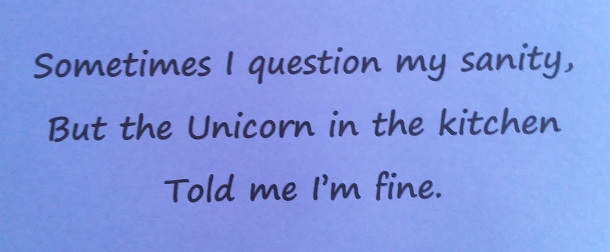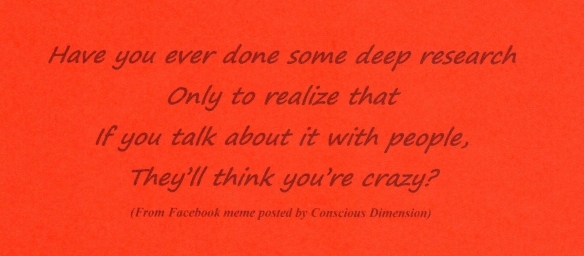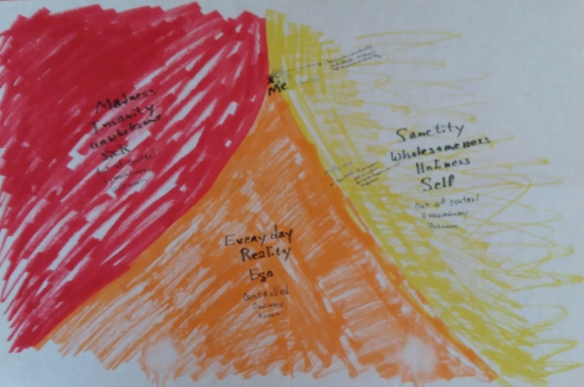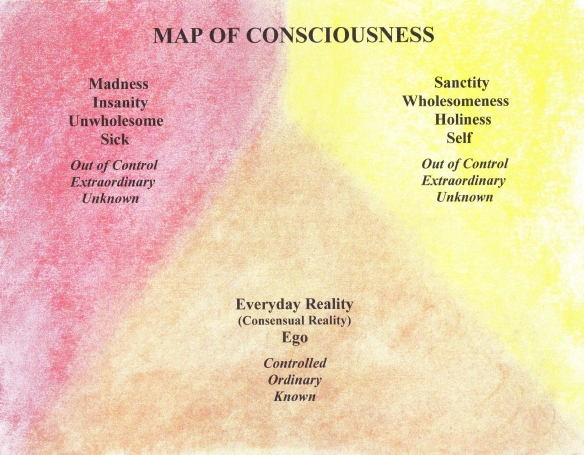Preface
Publishing this series on the medial personality is difficult for me. I am not an expert on anything except my own life and even there I’m still learning. My anticipation of others’ reactions threatens to derail the project. I am tempted to write for potential critics when I’m not on the verge of giving up altogether.
Concepts about the medial are complex and explaining them requires personal disclosure. It’s not easy to find the right balance of telling enough about myself to illustrate the concepts without making myself the focus. To counter that, I’m using material from my journal and from personal correspondence — revised only for clarity and for confidentiality. That writing is as unself-conscious and as honest as I get!
I want to reiterate something I wrote in the first article of this series:
“Listen for the echo of your own lives in what I’ve written. That is what is most important! Each of us knows more than we realize. Our ‘knowing; is not something anyone can teach us. It is something we already have; It is ours to discover or rediscover.”
Living in Two Worlds

While I can smile at the humor of this unicorn meme, it actually rings true for me. Events in the everyday world are disorienting. It is only in the depths of my inner world — a world where unicorns may be found — that I feel validated.
I was born living in two worlds. I think all of us are. As children we lived in the inner world of our imaginations as much as we did external reality of everyday consciousness. As we grew toward adulthood, this changed. The world of our imaginations was almost imperceptibly replaced by the consensual reality of everyday life. Some of us never stopped living in two worlds. It took many of us a long time to recognize this and some of us never will. It took me decades!
NOTE: I need to explain the words I use. Elsewhere I’ve written that the medial was born living in two worlds: “the outward world that is considered ‘reality’ by consensus and an inner world of the collective unconscious.” I interpret Jung’s term, ‘collective unconscious’ as an umbrella for other concepts that I associate with that realm: creativity, imagination, dreams, daydreams, fantasy, insights, intuitions, gut feelings, mystical experiences, altered states of consciousness, nonordinary experiences, etc. And so, I could also say that all of us were born living in the inner world of the collective unconscious and the outer world of the consensual reality.
I feel the unreality of ‘reality’. With a foot in each world, I can’t maintain my balance for very long. I fall to one side or the other. When I spend too much time in the consensual reality, I begin to believe in the separations that define it. Then I suffer. In the past I feared that complete immersion in the inner world would risk insanity. I don’t anymore.
I’m not sure when I began feeling drawn to this inner world. It had an eerie, seductive quality, and I called it the ‘Other Consciousness.’ It frightened me. I was afraid that I would get lost there and not be able to find my way back. And there was another fear, too:
“The fear that I’ll look foolish — that my body will be in one world and my consciousness in another, and I will act out in my body things appropriate to the other world but inappropriate to where it is.” (Poustinia Journal, July 1989)
Back then, I used Ira Progoff’s Intensive Journal to confront this Other Consciousness and my fear of it. The Intensive Journal provides a method for personifying concepts so that they can be explored in written dialogues — essentially inner conversations. Progoff called these conversations Dialogues with Events. It has always been my favorite part of the Intensive Journal.
After many dialogues over a period of several months, the Other Consciousness revealed itself as a trinity of concepts with one of them eventually shifting identities to that of my medial nature, ‘Medie’. That was in 1989.
In those dialogues, the Other Consciousness told me:
It is imperative that you learn to perform your role as medium (medial) correctly. There is much good that you could do. The dangers from a knowing misuse of that role are not nearly as great as its misuse from ignorance. And not much good can come from allowing it to happen — from allowing the ignorance to continue.
It would really help if you understood as much as possible about how the mediating works. You don’t have to deliberately use it. You already know some things about the process. At the very least, review and organize the knowledge you do have.
It would help if you could distinguish your own emotions from those belonging to someone else. It would also help if you could distinguish between responses that are genuinely to you from those that are to material that’s been mediated.
Being centered is a prerequisite to being able to make those distinctions, but you need to be more than just centered. Once you are centered, what you need to do will become clearer.
Despite my intention to immediately comply with this guidance, my inner work went into hiatus shortly after that. For the next twenty years or so my attention was drawn to the external world of school and work. Occasionally some personal distress would send me back to the Other Consciousness for assistance.
During the past decade, I’ve learned that when I have both feet firmly planted in the inner world, I can function well in both worlds — maintaining an awareness of oneness in the illusion of separation. It is not easy to do this, and far too frequently I fail. It is only in cooperating with Grace that I am able to do anything at all. It has taken most of my life to understand this. (Below is a quote from my Poustinia Journal from 2008)
Try walking with two ‘right’ feet. It’s easier than having a right foot and a left foot going in different directions.
Excerpts from my Poustinia Journal:
Sunday, October 22, 1989: (Reflecting on events surrounding my move from Iowa City to Los Angeles in 1973, a spiritual quest common to that time) That whole period in my life was lived at the point of convergence on my Map of Consciousness. I frequently lived in that Other Consciousness and my actions were determined by events there. But I also lived in the ordinary world and kept track of everyday reality and accepted responsibility for myself and the consequences of my actions in that everyday reality.
I remember, too, the confusion about which world to live in. The Other Consciousness usually felt more authentically ‘me.’ But sometimes it would seem too ‘far out,’ and I would switch back to everyday, practical reality where education, job, security and opportunities of advancement, conformity, etc., felt more appropriate. The ‘right’ thing to do. Acceptable. But I always knew which consciousness I was in. The confusion was about which to choose. The confusion over choice extends back before the period I wrote about — at least a year or two before that. And more likely all the way back to my childhood.
…I remember how the role of medial seemed to explain a lot of things that puzzled me about my problems with relationships. Recently while reading Codependent No More, I found in that whole syndrome (of codependence) a more complete and acceptable (reasonable, rational, normal) explanation of those same problems. Now this role of medial, psychic stuff comes up again. I suspect that they are both the same thing, but from different perspectives. Having weak boundaries is part of codependence, and I’ve also heard weak boundaries used as an explanation for psychic experiences.
I’m not sure where I am now on my Map of Consciousness, but I suspect I’ve been living more in ordinary reality, and my plans for school, career, marriage, etc. are in the ordinary reality. I wonder if they will continue to be so. Medie (My Role of Medial) and Other Consciousness both kept insisting on their importance in my life — “central to it” — no matter how much I argued against them. I hope the whole thing manages to be resolved, integrated, and made wholesome.
Earlier entries:
Sunday, May 29, 1988: I feel as if I live at the point of convergence of different ‘realities.’ I work hard at staying in the everyday, Ego reality, but occasionally drift toward Madness. It’s a weird, crazy sort of feeling that I try to avoid and push away. Depression, loneliness, unhappiness and anger aren’t a part of Madness. They are very much a part of the everyday, Ego reality. I want to live out of the Self, and I’ve been there enough to know what it’s like and that it’s possible to do that.
Self has a weird sort of feeling, too — weightless, free-fall. The initial experience of it is so much like Madness that I automatically push it away, too. The boundary between the Self and Madness is easily crossed and I’m afraid of moving toward the Self and finding myself in Madness instead.
Wednesday, April 26, 1989: I don’t have my ‘Map’ with me. But I feel as if I’m living out of my Self while trying to heal parts of Ego and Madness and having to fight the pull of each. If I can manage to do this — more or less by choice — maybe I will be able to handle ‘bad things’ happening without becoming severely depressed.
Ego reactions this morning. Feeling a little depressed. Insecurity about my ability to have loving relationships. Loneliness — wanting loving relationships. Reminded myself that living out of Self gives me all I need for me and for others. That is possible, and I can choose to do so.
Tonight feeling lonely and insecure — ‘different.’ Not like those who are people-oriented and with lots of people resources. Not as lovable as they. My most significant, human other is a professional relationship.
I’ve got to remember that feelings like this come from Ego. I’m not really needy or inadequate. I have it all within me. And I’ve been living out of that space for most of the last four months. That’s what I have to remember. Growth — and maybe eventual involvement with people — will come from that place within.
Let’s face it, I am different. Not eccentric or crazy, but ‘complex’ and ‘different’ and surprisingly simple, too.
Tuesday, June 27, 1989: After reading Chapter IV, Role of Woman as Mediator, in Irene Claremont de Castillejo’s, Knowing Woman, it’s obvious that the role of mediator (medial) is strongest in me. It explains a lot of things:
Needing to be alone so that I can sort out my own thoughts and emotions and distinguish them from the influences of others.
Being able to put on another’s skin and speak for him as I did so often in the various forms of group therapy — and for friends.
Why various people found my giving and caring to be threatening. G’s saying, “I was afraid you could see through me.” Maybe I saw too clearly. I was certainly experienced as being too intense.
The times I’ve misunderstood another but didn’t realize it until some time afterward. My delay in experiencing reactions to various events, feeling angry or insulted and discovering what I really wanted to say too long after the event to say it. Are these all part of being a medium, too? Having my identity so overshadowed by the person I’m with that I cannot respond as my Self until I am away from them, until I’m alone.
My Map of Consciousness. Feeling that I was at the convergence of Ego, Self, and Madness. The confusion of moving from one to another and feeling ‘crazy,’ or of being in two at once.
The poustinia is an appropriate vocation for a medial. But is it still mine? Can I achieve the greatest wholeness there? Or is marriage a better path for me? I would choose marriage if I could become whole enough to be a positive medial. Otherwise the quarantine of the poustinia would provide for the mutual protection of myself and the world around me. And maybe only in the solitude can I be positive enough to benefit both myself and the rest of the world.
Wednesday, June 28, 1989: I feel unlovable. Too different. Too uncomfortable. Too much the negative medial. When useful as a medial, too invisible. I pour myself out and there is nothing to fill me. In a marathon group therapy I did role playing for so many. Wanting someone to do that for me. No one did. No one could?
Anger (someone else’s not directed at me) – resistance to it makes me hard like a tuning fork. Opening to it makes me soft, and I let it flow through me and dampen its effect. So much material coming out. I feel overwhelmed by it at times. Drowning. I want a break from it. But afraid to stop the flow or try to slow it down.
Friday, June 30, 1989: How do I do that? How do I learn to control the mediating? Exploring the whole area of being a medial and an intuitive is a terrible temptation to pride and superiority. Every person I’ve known who has claimed to be psychic has been unbalanced and used the gift destructively. I would rather deny it than do that, but Irene Claremont de Castillejo says that it will just have to be dealt with by a later generation when other business would be more appropriate for them. I guess I’ll just have to wrestle with it as best I can.
There seems to be something very strong in me that will not allow the essential part of me to be lost or overshadowed for long. Self-preservation is a powerful force in me. My spiritual director has commented that I’ve continued to be my individual self even when it was confusing and uncomfortable to do so.
I really want to understand this medial role in myself. I want to see it for what it really is without all the prideful, ego inflating things getting in the way. I want to be able to distinguish events in the past when I operated as an undifferentiated medial from those that were something else entirely.
I honestly don’t think I’m a strong psychic. But something in me definitely appears to have acted as an undifferentiated medial. I have had difficulty sorting out my own thoughts and feelings from those of the people around me. ‘Impressionable’ I’ve called it. I am not as ‘impressionable’ as I used to be. Or am I? I’m not as ‘nice’ to unattractive people as I used to be. I’m most comfortable and at peace when I’m alone. But I’ve had lots of bad experiences with people since I was a child. Maybe this is all because I learned to be a people pleaser rather than being intuitive. Or do the two go together?
Map of Consciousness

These journal entries mention my Map of Consciousness. I chose to write about it last because it just sounds ‘crazy’!
I did a lot of work before I understood my reliance on the inner world. I experienced shifts that appeared to have more to do with different states of consciousness than with emotions. To sort this out, I created a map that divided consciousness into three, overlapping states: Madness, Sanctity, and Ego.
According to my Map of Consciousness:
Ego is everyday reality where things are:
- ordinary,
- controlled, and
- known.
Madness and Sanctity share qualities of being:
- extraordinary,
- out of control, and
- unknown.
They differ in that Madness is:
- insane
- unwholesome, and
- sick.
- Perhaps evil?
While Sanctity is:
- wholesome,
- holy, and
- the true Self.
There is a fine line between Madness and Sanctity and a point of convergence where the three states meet.
I created my Map of Consciousness before I learned about the medial (aka ‘mediumistic woman’), and found validation for it when I did. Plotting my experiences on the map, I often found that I was at or near the point of convergence. Below are two versions of my Map of Consciousness: a photo of the original and a recreation for clarity.

- Original Map of Consciousness probably created in early 1988 or before.

Map of Consciousness recreated for clarity.
References
Beattie, Melody. (1987) Codependent No More. Center City: Hazelden
Corson, Roberta Bassett. (1998). Wounds of the Medial Woman in Contemporary Western Culture. Santa Barbara: Pacifica Graduate Institute
de Castillejo, Irene Claremont. (1973). Knowing Woman: A Feminine Psychology. New York: Harper & Row.
Progoff, Ira. (1975). At a Journal Workshop: The Basic Text and Guide for Using the Intensive Journal Process. New York: Dialogue House Library.

THANK YOU for your work here and for your posts. i would like to share something that happened to me on a clear spring morning when i was 4 years old in the hopes that we are friends with the same unicorn. . i was given what i can only now call a “download”. i understood it though.. even if other people say to me that i was too young to understand what it conveyed. i was told “don’t go too far into the world other people call “real” because in truth, it is only a game”. i was told that “if i went too far into that world i would get lost.” ….and so it was. there are others out there who use the same words you use and the same words i use. often we keep these words secret. ( i post here because no one knows me and it is still then a “secret”. ) but your posts are part of your Work In The World. even if so much of the “world between worlds” within which we walk, is a pre-verbal world. and so it should be; given to those who can keep it sacred, and know how to escort The Mysteries through a dense foggy world that other’s call “real’. I have noted that it’s been 3 years since you’ve posted the blog i’ve just read. i stumbled upon it when looking for “Medial Woman”. i hope someday you continue… but if not…. fare thee well and thank you again.
LikeLike